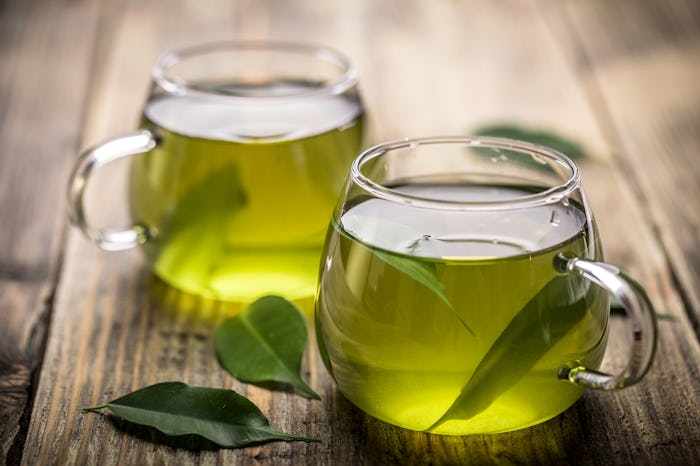Life

Should You Drink Green Tea While TTC?
If you've been trying to get pregnant for what feels like forever, you might wish for a magic potion right about now. Preferably an easy to find, not-too-expensive potion. Like green tea? The trying to conceive (TTC) boards are all over the place on green tea. Some say it blocks the absorption of folic acid, and others say it increases the cervical mucus necessary to get pregnant. Should you drink green tea while trying to conceive? According to Baby Center, the science is mixed. While some studies have shown that green tea might help, others concluded that drinking it might actually hurt your chances.
In an email interview, Mingxue Yang, MD, PhD of the New Hope Fertility Center writes that he recommends prenatal vitamins with folic acid and a CoQ10 supplement for couples trying to get pregnant. A Canadian study showed that the coenzyme Q10 improved egg quality in mice, according to Today's Parent, so it's possible that CoQ10 can help you conceive.
"It's important to know that not all supplements are equal," notes Yang. The method of delivery and the substances that the supplement is mixed with can determine its effectiveness, so patients should discuss the specifics with their doctor. If you're undergoing in-vitro fertilization (IVF), New Hope Fertility doesn't recommend any herbs, because interactions are complex and unpredictable. As Yang tells Romper,
"Overall, if someone is interested in a holistic supplement, we recommend them to a fertility acupuncturist. I just think many herbs need to be tested and researched further before they are recommended as a mainstream treatment option."
Truly, there's no magic pregnancy potion on the market today, so you can stop looking. If you want to get pregnant, the best thing to do is manage your diet and stress levels. So splurge on a massage, and watch your Body Mass Index (BMI).
According to Yang, "We know for a fact that a person’s body mass index or BMI affects their overall fertility ... When a couple is trying to get pregnant, I suggest they consider not just the hurdle of becoming pregnant, but also the health of the pregnancy and the health and quality of life of the baby afterwards."
New Hope Fertility Center asks patients with a BMI over 30 to lose about 10 percent of their body weight before starting IVF. "The key is to lose weight naturally, not too quickly, because that can be even worse for your health and your fertility," writes Yang.
Dr. Pat Salber, a former ER physician and founder of The Doctor Weighs In, seconds Yang's assessment. "Overweight women experience reduced fertility and an increase in the time it takes to conceive," Salber tells Romper. "One common cause of female infertility, polycystic ovary disease, is characterized by hormonal imbalances, including insulin resistance, that are directly linked to obesity."
Healthy habits don't just apply to women, either. According to both Yang and Salber, a healthy lifestyle improves the fertility of both men and women. Yang writes,
"I always advise a healthy diet which can help balance out not just your hormones, but also your mental health as well. Having a positive attitude and outlook on life definitely helps the fertility process. People underestimate the power of the mind, constantly. Good body image, confidence, and overall positivity really is an ally when treating infertility."
So forget magic potions if you're trying to conceive, and get back to basics, like a healthy lifestyle. According to Resolve, if you're under 35 and haven't conceived after a year of trying, or if you're over 35 and haven't conceived after six months, it may be time to speak with a fertility specialist. Approximately 10 percent of the population experiences infertility, so you're certainly not alone. Though you can find a great sense of community on the TTC boards, when it comes to specific questions about supplements or herbs, it's always best to consult your doctor.